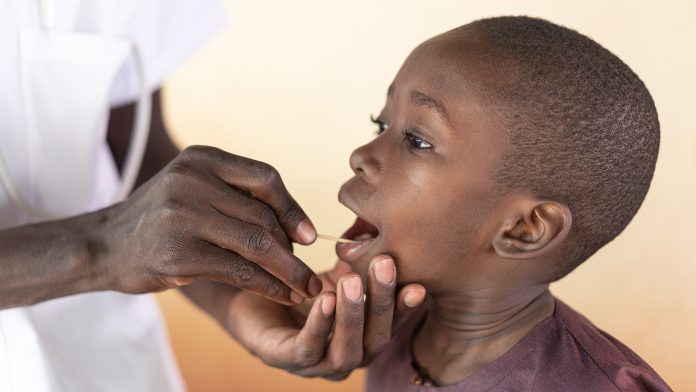
Researchers from the University of Birmingham are developing a non-invasive saliva test that could identify children across the Global South missing immunity to tetanus who may have missed the vaccine.
Childhood vaccinations fail to reach over 20 million children worldwide and the COVID-19 pandemic resulted in global coverage of diphtheria-tetanus toxoid-pertussis vaccine hitting a 15-year low, increasing those at risk of serious disease. Despite a global tetanus decline, the disease continues to cause unnecessary deaths in some low-middle-income countries (LMICs).
The research is backed by £1.1 million of Medical Research Council funding to allow the researchers to develop a low-cost lateral flow test that enables immunity to be tested easily, quickly, and without taking blood, which is currently the protocol.
What is tetanus and what are the current treatment options?
Tetanus is a life-threatening condition caused by bacteria getting into a wound. It is rare in the UK because a tetanus vaccine is offered as part of the routine vaccination schedule. This infection can cause lockjaw, painful muscle spasms, difficulty breathing, swallowing problems and sweating.
Current treatments require a hospital stay, which includes cleaning the wound to remove any dirt or dead tissue, an injection with a medicine called tetanus immunoglobulin, other medications and the potential use of an oxygen machine.
New test can be employed anywhere
The test requires laboratory testing and following this, will be employed in Rwanda in partnership with Rwanda Biomedical Center, the Africa Centre of Excellence for Sustainable Cooling and Cold-chain (ACES) and the Center for Family Health Research, based in Kigali. The researchers will assess how well the test works in real life and whether it is accepted in the local community.
Dr Jennifer Heaney, Research Fellow, University of Birmingham, commented: “Tetanus is a bacterial infection with a high death rate but preventable with vaccination. Eliminating the disease has been achieved in many countries, but in some countries, tetanus is still a public health problem and continues to cause unnecessary deaths every year.
“Our test shows if a person has protection against tetanus within 15 minutes. It can help identify individuals who are not protected and need vaccination. As tetanus vaccination features in all combined immunizations alongside other serious diseases, if an individual is unprotected against tetanus, they are also likely to be missing protection against other serious vaccine-preventable diseases. The test therefore can measure tetanus immunity but could also help identify broader gaps in vaccine provision.”
The test can also be used anywhere, improving access to immunity testing in locations unable to collect sero-epidemiology data. As a non-invasive saliva test, no blood sampling is required, which is expensive and not always desirable for children.
Dr Christopher Green, healthcare lead for ACES based at The University of Birmingham, commented: “Currently there is a lack of immunity data available to objectively evaluate vaccination systems and prioritize operational planning and deployment. Data from the test could support individual decision making and generate population estimates of immunity coverage.
“Both are important in ensuring we are developing efficient and sustainable vaccination polices. We look forwarded to helping evaluate how well the immunity tool developed works in the field with our Rwandan collaborators at The Centre for Family Health Research.”










